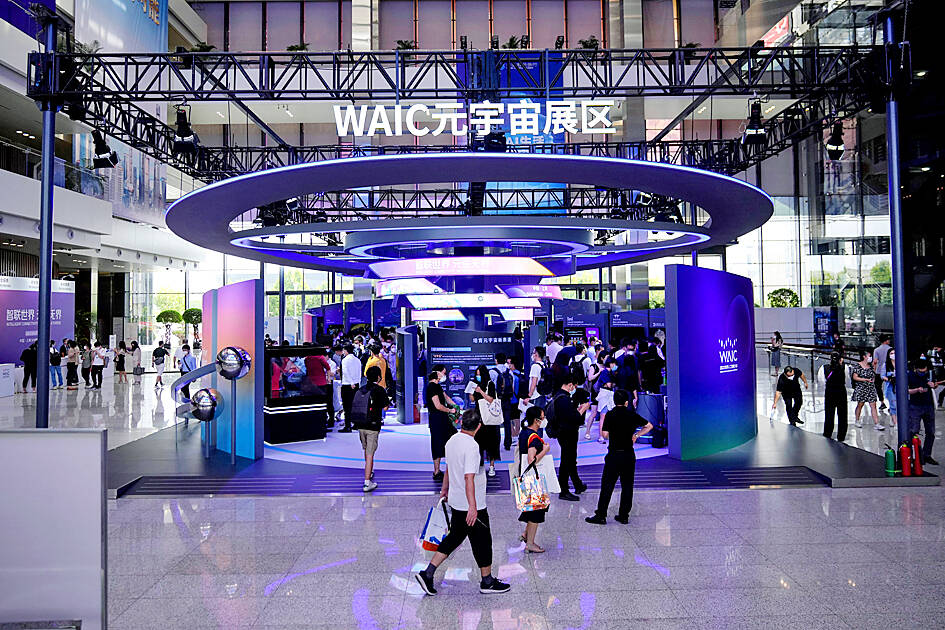US investors including the investment arms of Intel Corp and Qualcomm Inc accounted for nearly one-fifth of investments in Chinese artificial intelligence (AI) companies from 2015 to 2021, a report showed on Wednesday.
The document, released by CSET, a tech policy group at Georgetown University in Washington, comes amid growing scrutiny of US investments in AI, quantum and semiconductors, as US President Joe Biden’s administration prepares to unveil new restrictions on US funding of Chinese tech companies.
According to the report, 167 US investors took part in 401 transactions, or about 17 percent of the investments into Chinese AI companies in the period.

Photo: Reuters
Those transactions represented a total of US$40.2 billion in investment, or 37 percent of the total raised by Chinese AI companies in the six-year period.
It was not clear from the report, which pulled information from data provider Crunchbase, what percentage of the funding came from the US firms.
Qualcomm Ventures and Intel Capital were involved in 13 and 11 investments in Chinese AI companies respectively, outpaced by GGV Capital, which led US firms with 43 total investments in the sector, the data showed.
The Biden administration is expected to unveil an executive order this year curbing some US investments in sensitive Chinese tech industries as some lawmakers in Washington blame American investors for transferring capital and valuable know-how to Chinese tech companies that could help advance Beijing’s military capabilities.
According to the report, US investor GSR Ventures invested alongside China’s IFlytek Co (科大訊飛) in a Chinese AI company after the speech-recognition firm was added to a trade blacklist.
Silicon Valley Bank and Wanxiang American Healthcare Investments Group made investments in Chinese AI firms alongside China’s SenseTime Group Inc (商湯科技) before the powerhouse in facial recognition technology was added to the same blacklist.

Sweeping policy changes under US Secretary of Health and Human Services Robert F. Kennedy Jr are having a chilling effect on vaccine makers as anti-vaccine rhetoric has turned into concrete changes in inoculation schedules and recommendations, investors and executives said. The administration of US President Donald Trump has in the past year upended vaccine recommendations, with the country last month ending its longstanding guidance that all children receive inoculations against flu, hepatitis A and other diseases. The unprecedented changes have led to diminished vaccine usage, hurt the investment case for some biotechs, and created a drag that would likely dent revenues and

Macronix International Co (旺宏), the world’s biggest NOR flash memory supplier, yesterday said it would spend NT$22 billion (US$699.1 million) on capacity expansion this year to increase its production of mid-to-low-density memory chips as the world’s major memorychip suppliers are phasing out the market. The company said its planned capital expenditures are about 11 times higher than the NT$1.8 billion it spent on new facilities and equipment last year. A majority of this year’s outlay would be allocated to step up capacity of multi-level cell (MLC) NAND flash memory chips, which are used in embedded multimedia cards (eMMC), a managed

CULPRITS: Factors that affected the slip included falling global crude oil prices, wait-and-see consumer attitudes due to US tariffs and a different Lunar New Year holiday schedule Taiwan’s retail sales ended a nine-year growth streak last year, slipping 0.2 percent from a year earlier as uncertainty over US tariff policies affected demand for durable goods, data released on Friday by the Ministry of Economic Affairs showed. Last year’s retail sales totaled NT$4.84 trillion (US$153.27 billion), down about NT$9.5 billion, or 0.2 percent, from 2024. Despite the decline, the figure was still the second-highest annual sales total on record. Ministry statistics department deputy head Chen Yu-fang (陳玉芳) said sales of cars, motorcycles and related products, which accounted for 17.4 percent of total retail rales last year, fell NT$68.1 billion, or

In the wake of strong global demand for AI applications, Taiwan’s export-oriented economy accelerated with the composite index of economic indicators flashing the first “red” light in December for one year, indicating the economy is in booming mode, the National Development Council (NDC) said yesterday. Moreover, the index of leading indicators, which gauges the potential state of the economy over the next six months, also moved higher in December amid growing optimism over the outlook, the NDC said. In December, the index of economic indicators rose one point from a month earlier to 38, at the lower end of the “red” light.